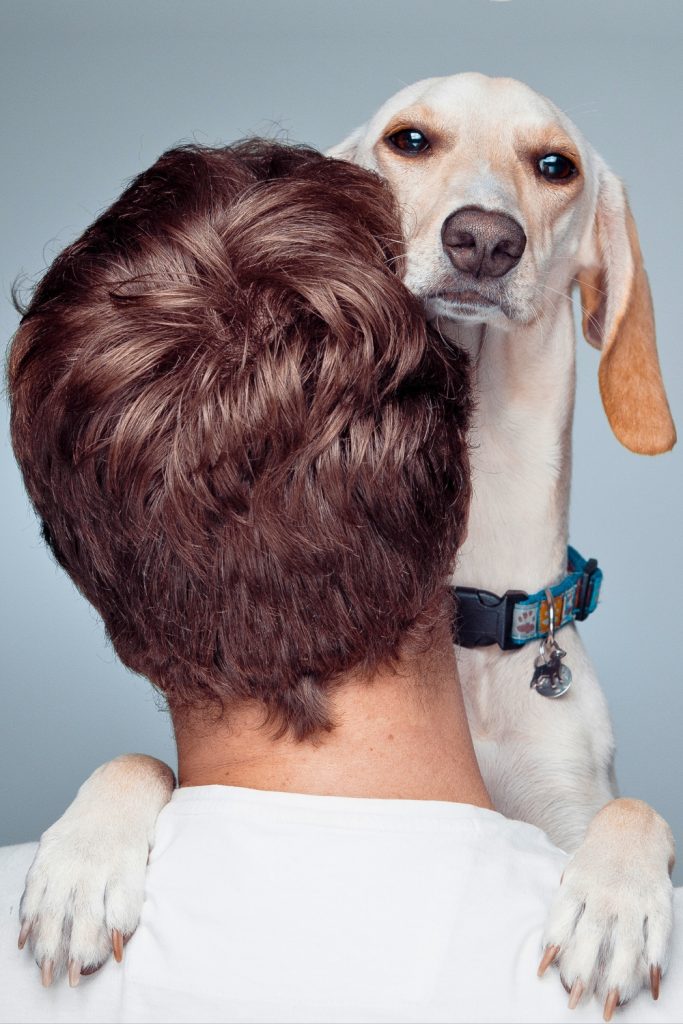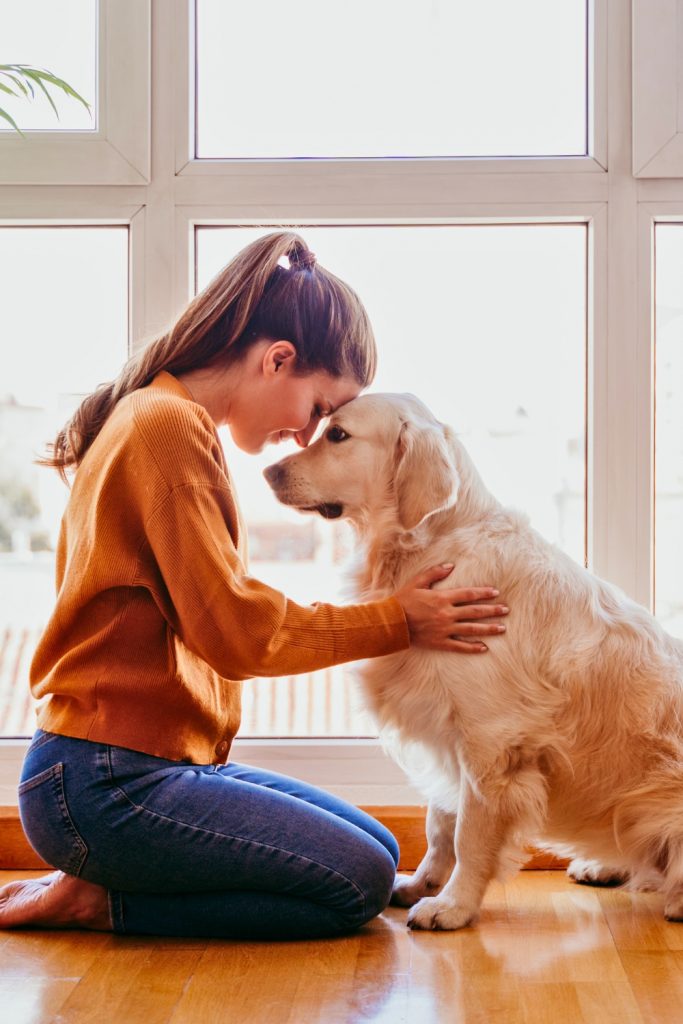If you live with a dog, you’ve likely stepped on their tail or bumped into them accidentally at some point.
In these moments, we realize we’ve caused them pain, and instinctively, we want to make amends. But is it possible to apologize to a dog? And if you do… will they understand?
In this article, I want to explain the best way to apologize to your dog and thus maintain the good relationship you have with them. Let’s dive in.
Do Dogs Understand Our Apologies?
This is one of the first questions you might ask when looking to apologize to your dog. The truth is, dogs don’t process apologies as we do, but they are very aware of our emotions and reactions.
When you apologize to your dog, they don’t understand the words per se, but they do pick up on the tone of your voice, your body language, and your actions.
Dogs are pack creatures and are experts at reading social cues. If you show remorse, your dog will notice it.
They might not grasp the abstract concept of an apology, but they do feel the love and affection you convey in those moments. That’s why it’s crucial to show that you didn’t intend to hurt them and that there’s no resentment.
They’ll sense your effort to amend the harm and preserve harmony. This will help you reconnect with your dog, reinforcing the bond you share.
Now, let’s see how to do it.
How to Apologize to a Dog
Apologizing to your dog when you’ve accidentally hurt them involves more than just saying “I’m sorry.” A truly effective apology means speaking to them in a gentle, soothing voice, like you would with a small child.
This method of communication lets them know they are not to blame for anything and that you pose no threat to them. And while they may not understand the exact words, familiar and positive phrases like “good dog” can help them understand that your intentions are kind.
Furthermore, I recommend approaching your dog calmly and gently to relieve any tension they might feel. But be careful not to make this mistake.
You might be tempted to hug them or kiss them on the head to show your remorse, but remember, for many dogs, this could be seen as a threat. While it might be a sign of affection for you, it could be quite intimidating for your dog.
Instead, it’s best to keep a calm demeanor. Let them decide to approach you when they’re ready, showing respect for their space and encouraging their confidence in approaching at their own pace.
If you do all this, you’ve apologized to your dog in the right way, but if you want to go a step further, here’s another tip.
You can use it when you’ve hurt them more severely by stepping on them or feel guiltier than usual. In these cases, try offering them a treat. This extra apology will be like a peace offering.
Place it in a spot accessible to them without forcing immediate interaction. This not only shows you’re trying to make peace but also diverts their attention from the incident to something more pleasant.

Can My Dog Hold a Grudge?
Often, after a mishap or accident, you might worry about this. In such instances, it’s crucial to observe how your dog behaves after a negative experience.
If they avoid eye contact, it could indicate that they’re still unsure around you. This happens more frequently in dogs with histories of abuse, as they tend to distrust and need time to process their feelings.
A dog that averts its gaze is generally trying to avoid interaction, which can be a sign that they need more time to feel secure with you.
On the other hand, if your dog is relaxed, shows no signs of anxiety, and actively seeks your company, they have likely forgiven you. Dogs’ tendency to forgive is an advantage, as they usually forgive our mistakes quickly when treated with love and delicacy.
To ensure your dog feels valued and loved, invest time in doing things they enjoy, like playing or simply spending quiet time together.
Avoid harsh discipline and focus on positive reinforcement and acknowledgment. Remember, your dog needs to feel like a part of your life and that they are important to you.
How Long Do Dogs Remember Bad Experiences?
Okay, now I’m going to give you some good news: dogs quickly forget isolated mistakes and accidents. If you ever accidentally stepped on your dog’s tail and apologized appropriately, it’s likely your dog has forgotten the incident almost as fast as it happened.
This ability to quickly forget isolated negative events is related to how canines manage their short-term memory.
However, I must explain that dogs do retain memories of repeated abuse or mistreatment. Dogs have what is known as associative memory, which means they can learn to associate certain behaviors with threats to their well-being.
For instance, if a dog is subjected to repeated mistreatment, they will remember these incidents as a pattern of danger and begin to see the aggressor as a constant threat.
This behavior isn’t grudge-holding, but a defense mechanism: the dog is trying to protect itself from future harm.
Therefore, you must understand that, although your dog may not remember every specific detail of a bad experience, they do remember the fear and anxiety associated with such experiences.
This can make them cautious or even fearful around certain people or in certain situations. These memories can affect their behavior and their ability to trust.
While mistakes and minor accidents can be easily forgiven by your canine friend, a continuous cycle of negative experiences can leave a lasting mark.
Always ensure you treat your dog with love and respect, not just because it’s the right way to care for them, but also because it’s essential to maintain a healthy and happy relationship with them.

How to Know If Your Dog Has Forgiven You?
Recognizing if your dog has forgiven you is easier than you might think: just observe how they act when you’re around.
A dog that has moved past a negative incident will actively seek your company, approach you joyfully to play, or snuggle up by your side. Additionally, you’ll see signs like a wagging tail, relaxed ears, and an overall open and playful attitude.
These behaviors are evidence that they trust you again and feel comfortable and secure with you.
However, if your dog still feels upset about what happened, their behavior will be quite different. They might avoid you, not look you directly in the eyes, or ignore your commands. Additionally, they will show signs of stress such as shrinking back, growling, or withdrawing when you approach.
These are clear indicators that they’re still upset. In this case, give them time and continue displaying positive and affectionate behaviors toward them.
With patience and love, your dog can feel secure and forgive you completely.
Everyday Things That Hurt Your Dog’s Feelings
Alright, actions like stepping on your dog’s tail or bumping into them accidentally are quite obvious, but there are other ways to hurt your dog’s feelings. Here are some of them to avoid:
- Inconsistency in Rules and Routine: Dogs rely heavily on consistency to feel secure. If one day you allow them on the sofa and the next day you scold them for the same behavior, it can create confusion and diminish trust. Make sure your rules and daily routines are consistent so your dog knows what to expect and how to behave.
- Lack of Attention: Neglecting your dog’s need for regular walks, playtime, and training can lead to behavioral issues like chewing or excessive barking. Dogs are social animals that require interaction to stay emotionally healthy. Engaging with them regularly strengthens their sense of security and overall well-being.
- Extended Periods of Solitude: Leaving your dog alone for long stretches can lead to separation anxiety and affect their mental and physical health. If your lifestyle keeps you away from home often, consider alternatives like doggy daycare, arranging for a dog walker, or having a trusted neighbor visit them. Also, providing interactive toys can help keep them entertained and reduce stress.
- Forcing Social Interactions: Not all dogs are outgoing. Forcing your dog into social situations that make them uncomfortable can lead to stress and anxiety. Pay attention to their body language and allow them to interact with other dogs and people at their own pace.
- Taking Away Their Resources: Taking away your dog’s favorite items as a form of punishment can lead to insecurity and reduced trust. Instead, use their favorite toys and treats to reinforce positive behavior.
- Physical Punishment: Harsh discipline such as shouting or hitting can severely impact your dog’s trust and well-being. Always opt for reward-based training methods that build trust and promote positive behaviors.
By understanding and avoiding these actions, you can prevent hurting your dog’s feelings and strengthen the bond you share.
FAQs
1. Do dogs know if you hurt them by accident?
Yes, dogs can sense when you’ve hurt them by accident, although they may not fully understand the concept of an accident as humans do. Dogs are very perceptive to your tone of voice, body language, and actions. If you immediately show concern and approach them gently, they can usually tell that you didn’t mean to cause harm. It’s important to soothe them with a calm voice and gentle touch to reassure them that it was unintentional and that they are safe.
2. How to know if your dog forgives you?
You can tell if your dog has forgiven you by observing their behavior. Signs of forgiveness include your dog approaching you willingly, wagging their tail, and showing relaxed body language. If your dog seeks your company, engages in play, or cuddles up to you, it’s a good indication that they’ve moved past the incident. On the other hand, if they avoid eye contact, shy away, or seem anxious around you, they might still need time to fully trust you again. Patience and consistent positive interactions will help rebuild trust.
3. What to do after accidentally hurting your dog?
If you accidentally hurt your dog, respond immediately with calm and gentle reassurance. Use a soothing tone of voice to let them know you didn’t mean to harm them, and avoid any sudden or aggressive movements. Approach them slowly, offering gentle pats or strokes if they seem receptive. If your dog is hesitant, give them space and let them come to you when they feel ready. Offering a treat as a peace gesture can help redirect their attention and reinforce your positive intentions. Always be patient and understanding.

Apologizing to your dog is more than just a verbal gesture; it’s about conveying your regret through tone, body language, and actions. Dogs are highly intuitive creatures that respond more to how you make them feel rather than what you say.
By offering gentle reassurance, respecting their space, and consistently treating them with love and kindness, you can quickly mend any rift and even deepen your relationship.
Remember, your dog doesn’t hold grudges, but ensuring they feel safe and loved will keep your bond strong and lasting.
